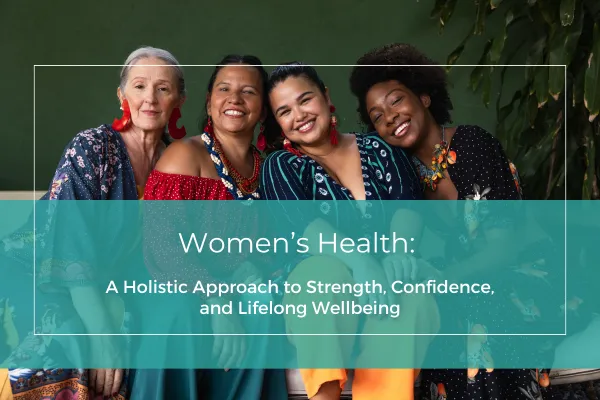
Women’s Health: A Holistic Approach to Strength, Confidence, and Lifelong Wellbeing
Introduction
When we talk about women’s health, we’re not just talking about managing symptoms or treating diseases. True wellness is about supporting the whole person, body, mind, and spirit, at every stage of life. From building strong bones to managing stress incontinence, from preventing falls to staying emotionally resilient, women deserve a healthcare approach that treats the whole picture, not just isolated parts.
Here’s how a holistic approach can empower women to live stronger, more confident, and more independent lives.
1. Physical Health: Foundation of Strength
Bone Health and Osteoporosis Prevention
Osteoporosis is more than a risk, it’s a reality for one in three women over 50. Hormonal shifts, especially after menopause, can accelerate bone loss. But this doesn’t mean you’re powerless.
Holistic bone health means:
Weight-bearing movement like walking, yoga, or strength training
Whole-food nutrition, rich in calcium, magnesium, and vitamin D
Stress management, which reduces cortisol levels that can deplete bone density
Targeted supplements, when necessary, under medical supervision
Making bone health a daily habit, rather than a reaction to a diagnosis, sets you up for long-term resilience.
2. Emotional and Mental Wellbeing: The Hidden Layer
Women often carry the emotional load for families, careers, and communities. Over time, this mental pressure can manifest physically, fatigue, anxiety, even chronic pain.
A holistic health perspective honors the connection between mental and physical health. Practices like:
Mindfulness or meditation
Journaling or creative expression
Counseling or women’s support groups
…can reduce stress, improve sleep, and even support hormonal balance. A balanced mind strengthens your immune system, supports hormone regulation, and enhances your body’s ability to heal.
3. Pelvic Floor and Core Health: More Than Just Incontinence
Stress incontinence may be common, but it’s not something you just have to "put up with." A weakened pelvic floor doesn’t just affect bladder control, it can also impact posture, digestion, and sexual health.
A holistic approach to pelvic health includes:
Pelvic floor physiotherapy
Kegel and deep core exercises
Nutritional support for tissue health
Breathwork, which improves muscle coordination
Empowerment through education, helping women talk openly and get support
Healing from the inside out restores not only physical function but confidence and freedom of movement.
4. Preventing Falls: Stability from the Ground Up
Fall prevention is about more than physical risk, it’s about freedom. The fear of falling can lead to less activity, more isolation, and a decline in physical and emotional health.
Supportive strategies include:
Balance and coordination training
Foot care and posture awareness
Environmental safety (e.g., home modifications)
Vision, hearing, and medication check-ups
But here’s the holistic link: when women feel safe and supported physically, they are more likely to stay socially connected, mentally sharp, and emotionally engaged.
5. Integrative Lifestyle Support
Holistic health thrives when we bring together movement, nutrition, rest, and purpose:
Movement improves circulation, brain health, and emotional regulation.
Nutrition fuels hormone balance, bone integrity, and energy.
Sleep supports repair, memory, and immune strength.
Connection and purpose, whether through relationships, hobbies, or community—reduce loneliness and enhance mental health.
Your body doesn’t function in isolation, and neither should your health care.
6. Your Next Steps: Small Shifts, Big Impact
Whether you’re just starting to prioritise your health or looking to go deeper, start with one shift:
Begin a daily walking or stretching routine
Add pelvic floor exercises to your morning routine
Swap one processed snack for a whole food alternative
Schedule that long-overdue health check-up or therapy session
Say “yes” to a local class or community group that inspires you
Holistic women’s health isn’t about perfection. It’s about tuning in, listening to what your body and mind need, and responding with care and commitment.
Final Thought: You Are Not Alone
Too many women suffer in silence, whether it's stress incontinence, chronic fatigue, fear of falling, or feeling disconnected from their bodies. But you don’t have to. Empowerment comes through information, support, and action.
Talk to your healthcare provider. Seek out holistic practitioners. And most of all, believe that your health journey deserves to be as complete and integrated as you are.
Because your health isn’t just about surviving, it’s about thriving.
